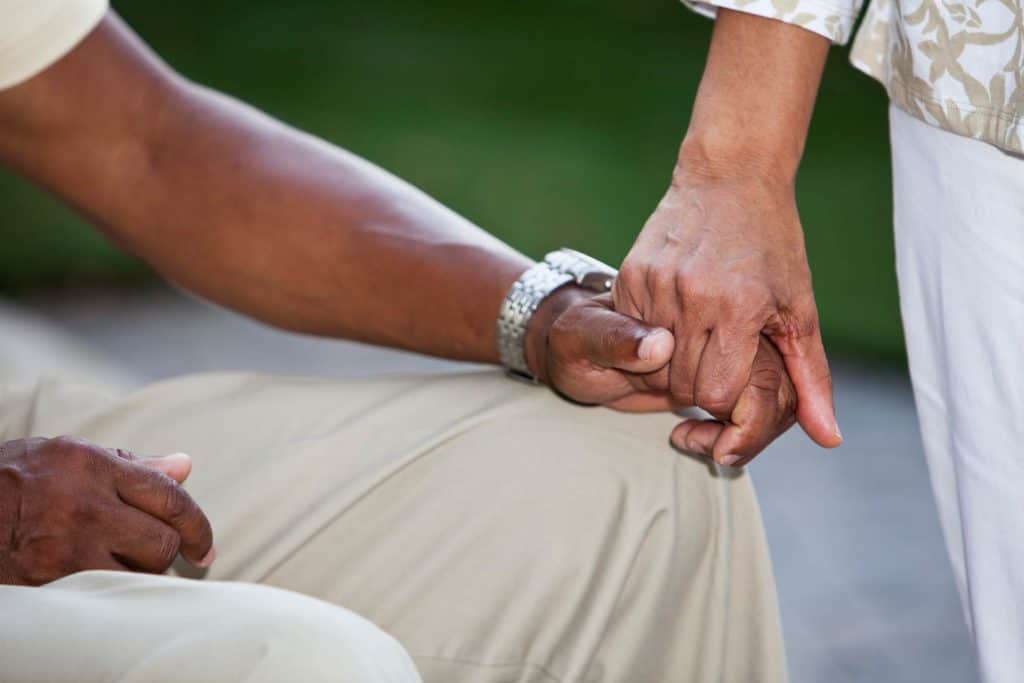The DAWN Method® is the strength-based person-centered and proactive way to care for those who are experiencing dementia or Alzheimer’s. When we understand how to work with the cognitive changes dementia causes, we can minimize the stress and loss that otherwise accompany it.
The DAWN Method will help you not only lower your stress as a caregiver, but maximize wellbeing for both you and your loved one.
Why this approach is different…
The DAWN Method is person-centered and habilitative in its approach, but goes further. Rather than suggest ways to respond once a difficult situation arises, the DAWN Method teaches caregivers and families how to recognize and meet the emotional needs that cause people to react with stress behaviors. It shows caregivers how to help people who are experiencing dementia regain a sense of security, not just provide for their wellbeing needs. In other words, it equips caregivers to be proactive.
The DAWN Method is also different in that it incorporates knowledge from the fields of neurology, psychology, philosophy, linguistics and mindfulness, not just medicine. Dementia affects not only our memory skills, but also our ability to use thinking, language and attention skills. Those changes affect our relationships, our ability to do tasks and keep ourselves safe, and our ability to understand what’s happening around us. Medical knowledge doesn’t give caregivers what they need to work with the emotional needs that result when someone’s ability to function changes in all these areas.
The DAWN Method was created by Judy Cornish, who put aside her career to spend a decade working with people who were living with dementia at home, often with no family nearby. From them, she learned what helps and what doesn’t, and was able to test what she learned with numerous clients over the years. Hers was a unique experience: to see what dementia looks like when someone is supported at home proactively, rather than after being allowed to fail and then moved (one trauma followed by another).

What dementia looks like from an experiential perspective
There are many places to learn about dementia, but if we love someone who’s experiencing it, what really helps is learning how to work with it. The DAWN Method looks at dementia from the perspective of how it changes the way we function and the emotions we feel as a result.
When we’re trying to solve a problem, the model we choose determines the solutions. The medical model is designed to deliver treatments and cures, yet there is no cure for those who are currently experiencing dementia. The logical response is then to use an experiential model—the model for providing care: we turn our attention to accommodating the person’s changing skills and emotional needs. When we know how to support the person in those two areas, we are equipped to work with dementia: accepting the person as they are and changing the environment so they can thrive. This is care.
Using the experiential model, it’s easier to see an overall pattern to the changes that dementia brings. We can see that it takes away our rational thinking skills but not our intuitive thinking skills; it takes away our remembering self but not our experiential self; and it takes away our ability to manage our own attention, but not our ability to enjoy beauty and companionship in the present.
These changes in our abilities can’t help but cause us frustration, embarrassment and distress. We now need help, even though life has taught us that we need to know what’s going on and be able to care for ourselves to stay safe. Our desire for dignity and autonomy continues, although our ability to care for ourselves fades. We need understanding and support from our companions.
Meeting the emotional needs caused by dementia
Dementia causes stress. Finding yourself unable to do things you used to do easily is frustrating and embarrassing, but finding yourself unable to make sense of what’s going on around you is deeply distressing. What we used to refer to as “dementia-related behaviors” are now being recognized for what they are: human stress responses. We shouldn’t be surprised that people experiencing dementia often react in ways that show they are stressed. The DAWN Method teaches family members and caregivers ways to meet their loved ones’ emotional needs proactively to avoid conflict and misunderstandings.
Using the DAWN Method, we can keep our loved ones at home longer. Staying at home longer means not only a higher quality of life, but also less expense—for families and for governments.
What is dementia?
Dementia causes the loss of memory skills, the loss of rational thinking skills, and loss of the ability to direct and manage our own attention. This impairment is progressive. Dementia is a condition, not a disease, although it can be the result of a number of diseases (such as Alzheimer’s, Parkinson’s and heart disease). People experiencing dementia are often unable to comprehend that they are becoming impaired, so they cannot understand why they would need help. This is another condition—something called anosognosia—which often accompanies the experience of dementia.
A summary of the stages of dementia
People experiencing Alzheimer’s or dementia progress through identifiable stages, regardless of the type of dementia they are experiencing, if we consider dementia from the perspective of changes in functioning rather than as a disease that’s progressing. Looking at changes in functioning allows us to plan for the next steps in the path dementia will take (i.e. to create care plans). We need to be able to anticipate and prepare for our loved ones’ evolving needs. Here’s a summary of the six stages of dementia from an experiential perspective:

Stage 1: Independence
We all begin the journey at the beginning—as able adults, but most of us are beginning to experience normal aging as well. We have been living independently, performing daily tasks and entertaining ourselves with little if any help. When our memory skills or thinking skills begin to fade, we put on our best front and hide our growing confusion and failures from those around us. We can’t help but fear losing privacy and autonomy. So when family and friends offer to help, we’re likely to refuse, saying: “Thanks for your offer of help, but I’m managing just fine on my own.”

Stage 2: Uncertainty
However, one day (or night), we find ourselves unable to solve a problem or complete a task—something that should have been simple—and we lose faith in ourselves. You’ll know your loved one has entered this second stage when they begin to invite you over more often or want to know when they’ll see you next. Their confusion and inability to complete tasks is increasing. They lose things and make simple mistakes in judgment. They miss appointments and have no memory of entire days. Now they will be more amenable to your help, and now it’s time for someone to check in every day.

Stage 3: Follow the leader
Next, watch for changes in their ability to exercise choice. We need memory skills to bring options to mind, and rational thinking skills to compare them and make a selection. When your loved one seems more easygoing (“I’ll have what you’re having” or “Whatever you’d like to do is fine, honey”), it’s time to up the care plan. Losing memory and thinking skills also means that they are becoming less able to track time, read clocks and calendars, perform selfcare tasks—and perceive risk. Now it’s time to watch for changes in weight, hygiene, and home maintenance. It’s time for a daily activity with someone who understands their changing skills and emotional needs, and ever longer hours with care partners.

Stage 4: Clinginess, or clingy dementia
We become clingy when we have lost our rational thinking and memory skills to the point that we can no longer interpret what is happening around us. We no longer feel secure. If we have learned that our homes are our safe place, we can still live alone, but we are likely to follow our primary caregiver from room to room or need constant reassurance, for we are living in the three-second now. We are trapped in the present without knowledge of the past or ability to solve problems (deal with the future). Now we need help with even the simplest tasks and most people are strangers to us. Routine and consistency are critical. We will soon need an overnight care partner.

Stage 5: Overnight care
When your loved one invites you or anyone else to stay over, it is time. When our ability to understand what is happening around us is gone, we need someone there who can be our guide and coach. During the day we can still enjoy an hour or two of privacy in our own homes, but being alone for longer is distressing. We need help with every task—someone to lead us and to find appropriate social and sensory stimulation for us. Now, filling my presence with what’s beautiful to me is your ticket to companionship and peace. At this point it’s clear that one of the skills we lose to dementia is the ability to initiate activities and keep our brains active and engaged. We need your help.

Stage 6: Fulltime care
When we have lost the ability to understand the world around us, and to recognize the people in our lives, we are in the final stage of dementia. We have not lost ourselves, however, nor are we lost to our loved ones, if they become our memory keepers and storytellers. We need them now to tell us who they are, who we are, whom we love and who loves us, and to do it with love and acceptance rather than concern and sorrow. Without rational thinking and memory skills, we do best with a consistent routine and peaceful environment. However, we still need our companions to bring beauty to us and enrich us with their presence.
This is a summary of the stages of dementia from an experiential perspective. To learn about the stages in more detail, take a look at our Stages of Dementia page. When we can watch for and respond to peoples’ changing ability to function, and recognize their emotional needs, we can customize our care plans appropriately. With the right amount of care, our loved ones are more likely to accept and less likely to put themselves at risk by refusing our offers of help.

Next steps…
- Are you a family? Go to our “Caring for someone with dementia at home” dementia roadmap.
- Are you a professional caregiver? Check out the Dementia Care Specialist Certification course.
- Are you an agency or a facility? Explore our DAWN Partner dementia training program for caregivers and staff.
FAQs about dementia and person-centered dementia care
Dementia brings memory loss and progressive cognitive impairment. It is not a disease itself, although it can be the result of a number of diseases such as Parkinson’s, Alzheimer’s, alcoholism, and cardiovascular disease. People experiencing dementia are often unable to be unaware that they are impaired, so cannot understand that they need help. This condition is called anosognosia, and often occurs with dementia.
Strength-based, person-centered care for dementia is care that provides assistance for what a person can no longer do while working with the skills they have and will retain. The opposite of care is treatment, which focuses on dementia as a disease and utilizing treatments or medications to try to turn them back into who they once were. People who are experiencing dementia lose the ability to access the past (their memory skills) but none of the skills needed to enjoy the present. They lose their rational thinking tools (understanding explanations and making sense of information), but not their primary thinking skills: intuitive thought. That’s good news, because it’s intuitive thought that lets us enjoy the good things in life, including companionship, pets, beauty and music. When our companions and caregivers know what we can and can’t do, they can stop embarrassing and frustrating us, and we both enjoy less stress. That’s what makes the DAWN Method different: it teaches families how to recognize the strengths in dementia so they can be proactive in planning care and minimize stress and expense.

